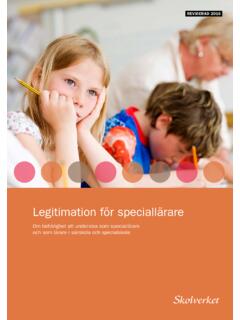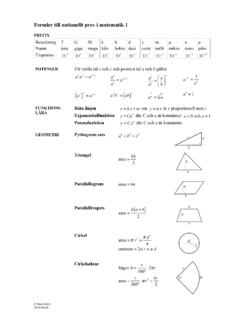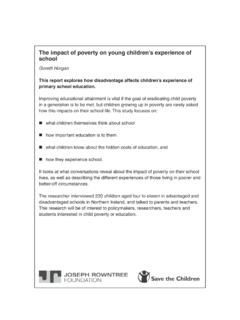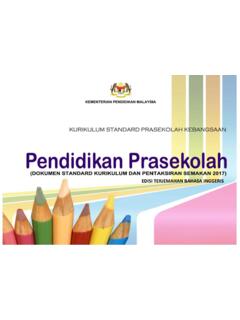Transcription of Curriculum for the compulsory school, preschool class and ...
1 compulsory school . Curriculum for the compulsory school , preschool class and school -age educare REVISED 2018. Curriculum for the compulsory school , preschool class and school -age educare 2011. Revised 2018. To order, please contact: Norstedts Juridik kundservice SE-106 47 Stockholm Phone: +46 8 598 191 90. E-mail: ISBN: 978-913832734-0. Illustration: Tobias Flygar Production: AB Typoform Print: Danag rdLitho 2018. Contents 1. Fundamental values and tasks of the 5. 2. Overall goals and 10. Norms and 10. 11.
2 Responsibility and influence of 13. school and 14. Transition and 15. The school and the surrounding 15. Assessment and 16. Responsibility of the 17. 3. preschool 19. The aim and core content of the preschool 19. 4. school -age 23. The aim and core content of school -age 23. 5. 27. 27. 34. Home and consumer 42. Physical education and 48. 55. Modern 66. Mother tongue tuition Mother Tongue except national minority 86. Mother Tongue Finnish as a national minority 95. Mother Tongue Yiddish as a national minority 111.
3 Mother Tongue Me nkieli as a national minority 127. Mother Tongue Romani as a national minority 143. 159. 166. 177. Chemistry .. 188. 198. 208. 218. 227. 238. 255. 262. Swedish as a second 274. Sign language for the 287. 296. 1. Fundamental values and tasks of the school Fundamental values The national school system is based on democratic foundations. The Education Act (2010:800) stipulates that education in the school system aims at pupils acquiring and developing knowledge and values. It should promote the development and learning of all pupils, and a lifelong desire to learn.
4 Education should impart and establish respect for human rights and the fundamental democratic values on which Swedish society is based. Each and everyone working in the school should also encourage respect for the intrinsic value of each person and the environment we all share. The inviolability of human life, individual freedom and integrity, the equal value of all people, equality between women and men, and solidarity between people are the values that the school should represent and impart. In accordance with the ethics borne by a Christian tradition and Western humanism, this is achieved by fostering in the individual a sense of justice, generosity, tolerance and responsibility.
5 Teaching in school must be non-denominational. The task of the school is to encourage all pupils to discover their own uniqueness as individuals and thereby be able to participate in the life of society by giving of their best in responsible freedom. Understanding and compassion for others The school should promote understanding of other people and the ability to empa- thise. Concern for the well-being and development of the individual should permeate all school activity. No one should be subjected to discrimination on the grounds of gender, ethnic affiliation, religion or other belief system, transgender identity or its expression, sexual orientation, age or functional impairment or other degrading treat- ment.
6 All such tendencies should be actively combated. Xenophobia and intolerance must be confronted with knowledge, open discussion and active measures. The internationalisation of Swedish society and increasing cross-border mobility place high demands on the ability of people to live with and appreciate the values inherent in cultural diversity. Awareness of one's own cultural origins and sharing in a common cultural heritage provides a secure identity which it is important to develop, together with the ability to understand and empathise with the values and conditions of others.
7 The school is a social and cultural meeting place with both the opportunity and the responsibility to strengthen this ability among all who work there. Curriculum FOR THE compulsory school , preschool class AND school -AGE EDUCARE 2011 5. FUNDAMENTAL VALUES AND TASKS OF THE school . Objectivity and open approaches The school should be open to different ideas and encourage their expression. It should emphasise the importance of forming personal standpoints and provide opportunities for doing this. Teaching should be objective and encompass a range of different approaches.
8 All parents should be able to send their children to school , fully confident that their children will not be prejudiced in favour of any particular view. All who work in the school should uphold the fundamental values that are set out in the Education Act and in this Curriculum , and clearly dissociate themselves from anything that conflicts with these values. An equivalent education Teaching should be adapted to each pupil's circumstances and needs. It should promote the pupils' further learning and acquisition of knowledge based on pupils'.
9 Backgrounds, earlier experience, language and knowledge. The Education Act stipulates that the education provided in each school form and in school -age educare should be equivalent, regardless of where in the country it is provided. National goals specify the norms for equivalence. However, equivalent education does not mean that the education should be the same everywhere or that the resources of the school are to be allocated equally. Account should be taken of the varying circumstances and needs of pupils.
10 There are also different ways of attaining these goals. The school has a special responsibility for those pupils who for different reasons experience difficulties in attaining the goals that have been set up for the education. For this reason education can never be the same for all. The school should actively and consciously promote the equal rights and opportunities of pupils, regardless of gender. The school also has a responsibility to combat gender patterns that limit the pupils' learning, choices and development.












